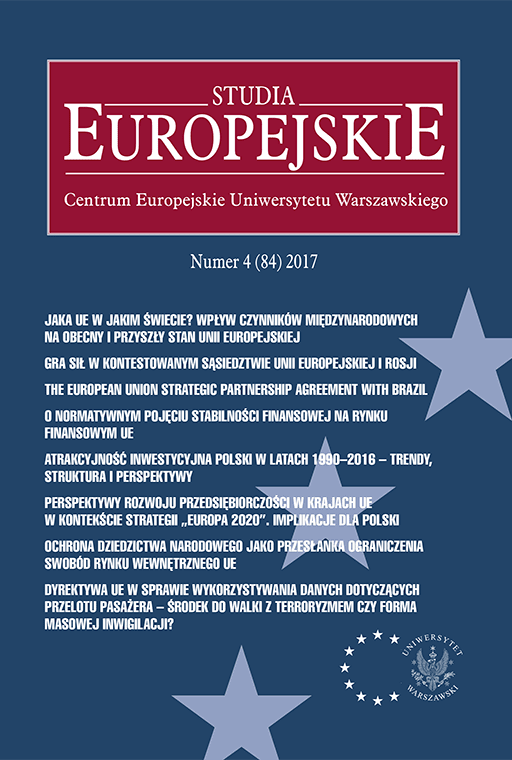
ISSUE: 4/2017
- Volume 84
- Number 4
- 2017
Subscribe NEWSLETTER
Studia Europejskie –
Studies in European Affairs
ISSN: 1428-149X
e-ISSN: 2719-3780
License
Articles published in the journal are under a Creative Commons Attribution – Non Commercial – No Derivatives 4.0 International License
Stosunki turecko-ormiańskie w świetle opinii tureckiej
Turkish-Armenian Relations in the Light of Turkish Opinion
Abstract
Turkey, as a state operating in accordance with the well-known saying by its first President, Mustafa Kemal Atatürk, Evde sulh cihanda sulh, and aspiring to good relations with all its neighbours, started negotiations onestablishing diplomatic relations with Armenians in 2009, using Switzerland as a mediator.
Armenia’s increasing economic and financial dependency on Russia contributes to the growing poverty in widening social circles in the country, which are to a certain extent interested in opening the border
with Turkey. Cross-border trading could improve the material situation of many Armenians. Turkey, on the other hand, aspires – although not unanimously – to join the European Union, who is pressuring it to raise the standards of, among other things, democratic behaviour towards its ethnic minorities; the current Turkish government is therefore very interested in softening and regulating its relations also with Armenia (who wants to strengthen its relations with Europe), which would be very well received by the West and to a certain extent move forward the difficult process of integrating Turkey with the EU. Therefore in both countries, Armenia and Turkey, the trends towards establishing diplomatic relations
and open the borders have been growing recently. This was supported by the pressure from the USA, as the American diplomacy was making efforts to bring both feuding countries to start negotiating.
References
1915 Olaylarına Dair Türk-Ermeni uyuşmazlığının tarihi arka planı, AVIM, Ankara 2015.
Alijew N., Ameńsko-azerbejdżański konflikt Górnego Karabachu w świetle prawa międzynarodowego, Warszawa 2012.
Chmielowska D., Polonya yayınlarında Doğu Anadolu’da Türk ve Müslüman nüfusa yapılan soykırımlar 1914–1920, w: Azerbaycan ve Şarqi Anadoluda Türk-Müsalman Ehaliye Karşı Soyqırımları, Baku 2015.
Chmielowska D., XX yüzyılın sonunda Türk diplomatları tarafın Dan Polonyalılara tarih boyunca Ermenilerlr ilişkileri açıklaya bir yazı ve tarihçilerimizin görüşü, Azerbaycan ve Şarqi Anadoluda Türk-Müsalman Ehaliye Karşı Soyqırımları, Baku 2016.
Ismayılı T., Rosyjski plan dla Armenii, „Uważam Rze. Historia”, nr 6(63), czerwiec 2017, s. 28–29, Warszawa.
Kolbaşı A., 1892–1893 Ermeni Yafta Olayları (Merzifon-Yozgat-Kayseri), Istanbul 2011.
Marshall Lang D.M., Armenia. Kolebka cywilizacji, Warszawa 1975.
Musajew T., Kosowo a roszczenia Armenii wobec regionu Górnego Karabachu Azerbejdżanu (Porównawcza analiza prawna), Warszawa 2013.
Palabıyık M.S., Understanding the Turkish-Armenian Controversy Over 1915, Ankara 2015.
Zakrzewska-Dubasowa M., Historia Armenii, Wrocław 1990.
Language: Polish
Pages: 203-218
How to Cite:
Harvard
Chmielowska, D. (2017) "Stosunki turecko-ormiańskie w świetle opinii tureckiej". Studia Europejskie – Studies in European Affairs, 4/2017, pp. 203-218.